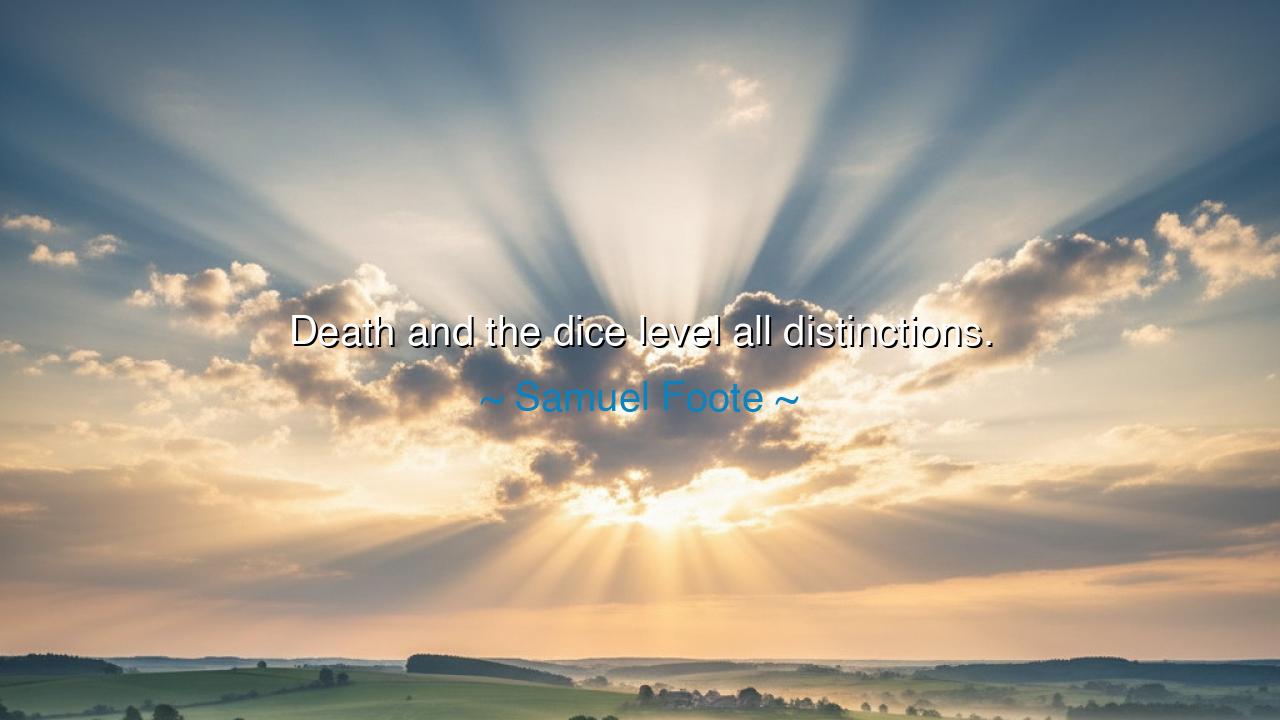
Death and the dice level all distinctions.






The words of Samuel Foote — “Death and the dice level all distinctions.” — carry the deep, resonant truth that echoes through every age of humankind: that fortune and mortality are the two great equalizers of the world. Spoken by a wit of the eighteenth century, this saying is both a jest and a revelation. It captures the paradox of life — that no matter how vast the distance between the rich and the poor, the wise and the foolish, the ruler and the beggar — there come moments when all are made equal by the unseen hand of fate, and finally by the silence of death. In these words, Foote, a man of the stage and satire, reminds us that all distinctions built by pride, wealth, or power are but illusions before the two arbiters that care nothing for our pretenses: chance and death.
To understand the depth of this statement, one must know its origin and its author. Samuel Foote, an English playwright and actor of the 1700s, was famed for his sharp humor and fearless mockery of society’s elites. He saw the vanity of those who thought themselves immortal by rank or privilege, and he revealed the truth with laughter — that life itself is a game of dice, governed as much by luck as by reason, and that death, the final throw, spares no one. When he says that “death and the dice level all distinctions,” he speaks from the same eternal insight that guided the philosophers and poets of old: that life, for all its hierarchy, is fleeting, and that fate — like death — is blind.
The ancients would have understood Foote’s meaning well. The Greeks told of Tyche, the goddess of fortune, whose wheel turned without mercy, raising kings and casting them down in a single spin. The Romans, too, spoke of Fortuna, who smiled and betrayed with equal indifference. The great emperor and the humble farmer both lived under her rule. And Death, her silent twin, was ever close behind, gathering all souls alike into his keeping. It is this eternal truth that Foote captures — that no man, however wise or mighty, can control the hand that life deals him, nor escape the certainty that follows. In both dice and death, all men are equal players in a game that ends the same way for all.
History, too, bears witness to this leveling power. Consider Alexander the Great, who conquered the known world before the age of thirty, and who wept for lack of more worlds to subdue. Yet at the height of his glory, he fell ill and died, his vast empire crumbling within years. His generals divided his spoils, and his body — once worshiped — turned to dust like any man’s. So too did Marcus Licinius Crassus, the wealthiest man in Rome, who sought greatness through power and perished miserably in a failed war against the Parthians, his mouth filled with molten gold by his enemies in mockery of his greed. Such are the dice of life — cast by fortune, claimed by death. The throne and the grave are not so far apart as the proud imagine.
Yet Foote’s wisdom is not meant only to humble, but also to free. If all distinctions are leveled in the end, then the wise man lives without envy and without arrogance. He does not despise the poor nor worship the rich, for he knows that all drink from the same cup of time. He plays his part with grace, accepting that luck may lift or cast him down. In this way, he learns to laugh, as Foote did — not in bitterness, but in recognition of the great comedy of existence. For laughter, when born from understanding, is a kind of enlightenment: it releases us from fear and pride, and teaches us to live lightly, even as the dice roll on.
There is another lesson in Foote’s words, one that speaks to the heart of morality. Since death makes all men equal, the true measure of worth lies not in station, but in character. Titles, riches, and honors perish, but goodness endures in the memory of others. The one who rules with justice and the one who serves with dignity are bound together in the tapestry of human story, long after death has claimed their names. Thus, Foote’s phrase becomes a quiet commandment: do not live for what fortune gives, but for what virtue makes of it. The dice may determine your position, but your choices determine your soul.
In the end, death and chance are the twin reminders that nothing belongs to us but the way we live. The proud will learn humility, the fearful will learn courage, and the greedy will learn the emptiness of gain. All distinctions fade before the horizon of eternity, and the dice that roll across the table of life obey no master’s hand. The wise do not curse this truth; they bless it. For in that equality — in knowing that all must lose what they have gained — there is peace. It frees the heart to live fully, to love deeply, and to act rightly while the moment is still ours.
So let the teaching of Samuel Foote be passed down through the ages: “Death and the dice level all distinctions.” Play your part with courage, and laugh at the illusions of rank and fortune. Accept your victories with gratitude and your losses with grace, for neither define you. When the game ends, as it must for all, let your legacy be not what the dice gave you, but what you gave the world — a life lived with wisdom, humility, and joy before the final throw.






AAdministratorAdministrator
Welcome, honored guests. Please leave a comment, we will respond soon